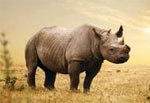






As part of interventions to address the scourge, cabinet recently approved that South Africa prepares and submits a rhino trade proposal for consideration at the 17th Conference of Parties of the Convention on International Trade in Endangered Species of Fauna and Flora (CITES) in 2016. The cabinet also approved the establishment of a Task Team to assist in preparation for the CoP17 CITES, since the development of a trade proposal should take into account numerous aspects, including the appropriate model for trade; the anticipated changes in the markets and the demand for rhino horn; the additional control measures and requirements to be introduced; and potential trade partners.
The decision to table a proposal at the next CITES CoP was not taken lightly. It followed an extensive public consultation process, nationally and internationally. In 2012 a national consultation process, known as the Rhino Issue Management process relating to rhino conservation was initiated with various stakeholders. This process resulted in the Rhino Issue Manager (RIM) Report that has since been tabled in cabinet and MECs. The RIM Report makes recommendations on funding, rhino conservation, safety and security, and commerce (trade).
On the matter of international trade for commercial purposes, as was presented and approved by cabinet recently, this will only be allowed if approved by the Conference of Parties. Currently, international trade in rhino horn for commercial purposes is prohibited and this prohibition can only be lifted, if agreed by the CoP. To ensure parties to CITES are able to make a decision relating to this matter, a proposal must be submitted for consideration by the parties.
The South African government believes trade must be seen in the broader context of a myriad of interventions being implemented to address the scourge of rhino poaching. Government does not view trade as a panacea for the on-going scourge, but is part of a number of measures implemented.
The recent cabinet meeting also approved the establishment of an Inter-Ministerial Committee (IMC) comprising of the ministers of Water and Environmental Affairs, International Relations and Cooperation, Trade and Industry, of Finance, Science and Technology, of Agriculture, Forestry and Fisheries, of Rural Development and Land Reform, of Economic Development and of Tourism, to provide guidance relating to preparations in respect of the trade proposal. The Task Team responsible for the technical details referred to above will report to the IMC. Despite our stated objective to present a trade proposal at COP17, South Africa will continue to employ numerous safety and security measures.
Among the steps that have already been taken are:
In addition, the National Environmental Management Laws First Amendment Bill [B13B-2012] aimed at strengthening the regulatory and enforcement provisions to prevent abuse of the hunting permitting system is at an advanced stage in the parliamentary process, and is expected to be enacted within the coming months. Once promulgated, the amendments will ensure that a person involved in an illegal restricted activity, but who does not physically carry out that activity, can also be found guilty of an offence. The bill further prescribes that all specimens in transit through the country must be accompanied by the necessary documentation. This important provision will assist in addressing the movement of illegal specimens.
With regards to strengthening the regulatory and enforcement provisions in the hunting industry, the bill will allow the minister to limit the number of permits that can be issued in order to protect a species. The government would like to reiterate its commitment to working in partnership with stakeholders and experts to ensure a feasible model for trade is proposed at the next CoP in South Africa. All views expressed by interested and affected stakeholders involved in rhino conservation will be considered.
South Africans are urged to report incidents of poaching and tip-offs to the anonymous tip-off lines +27(0)800 205 005, +27(0)8600 10111 or Crime-Line on 32211.
| SA | 2010 | 2011 | 2012 | 2013 |
|---|---|---|---|---|
| KNP (SANParks) | 146 | 252 | 425 | 297 |
| MNP (SANParks) | 0 | 6 | 3 | 0 |
| GP | 15 | 9 | 1 | 1 |
| LIM | 52 | 74 | 59 | 50 |
| MP | 17 | 31 | 28 | 34 |
| NW | 57 | 21 | 77 | 53 |
| EC | 4 | 11 | 7 | 2 |
| FS | 3 | 4 | 0 | 0 |
| KZN | 38 | 34 | 66 | 43 |
| WC | 0 | 6 | 2 | 0 |
| NC | 1 | 0 | 0 | 0 |
| 333 | 448 | 668 | 480 |
| South Africa - Arrests | 2013 | 2012 | 2011 | 2010 |
|---|---|---|---|---|
| KNP | 60 | 73 | 82 | 67 |
| MNP | 0 | 0 | 0 | 0 |
| Gauteng (GP) | 3 | 26 | 16 | 10 |
| Mpumalanga (MP) | 9 | 66 | 73 | 16 |
| Eastern Cape (EC) | 0 | 0 | 2 | 7 |
| Limpopo (LP) | 27 | 43 | 34 | 36 |
| North West (NW) | 11 | 32 | 21 | 2 |
| Free State (FS) | 0 | 6 | 0 | 0 |
| KwaZulu-Natal (KZN) | 30 | 20 | 4 | 25 |
| Western Cape (WC) | 0 | 0 | 0 | 2 |
| Northern Cape (NC) | 0 | 1 | 0 | 0 |
| Total | 140 | 267 | 232 | 165 |
For more information, go to www.environment.gov.za.